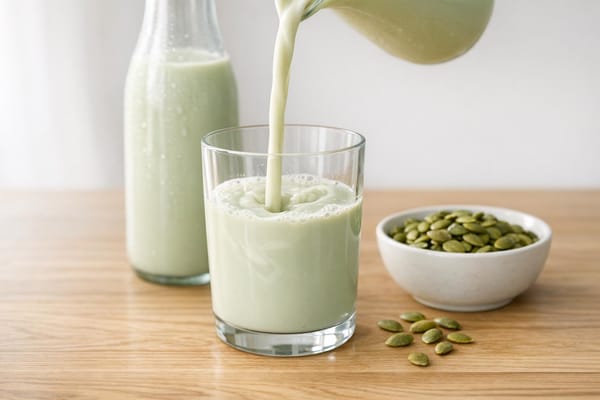Lactose Intolerance in Pregnancy: Safe Dairy Options
Learn how to manage lactose intolerance during pregnancy with safe dairy options and calcium-rich alternatives for you and your baby's health.

Lactose intolerance during pregnancy can make it hard to meet your calcium needs while managing discomfort. But don’t worry - there are plenty of ways to get the nutrients you and your baby need without the symptoms caused by dairy.
Here’s how you can manage lactose intolerance while pregnant:
- Lactose-Free Dairy: Options like lactose-free milk, cheese, and yogurt provide calcium without digestive issues.
- Calcium-Rich Non-Dairy Foods: Leafy greens, fortified plant milks, tofu, chia seeds, and fortified orange juice are excellent alternatives.
- Lactase Supplements: Enzyme supplements like milktab can help you digest dairy more easily.
- Fermented Dairy: Products like kefir and Greek yogurt are easier to digest due to reduced lactose content.
Pregnant women need 1,000 mg of calcium daily to support their baby’s growth and their own health. Work with your healthcare provider to create a diet plan that includes these options, ensuring you meet your nutritional needs comfortably.
Understanding Lactose Intolerance and Its Effects
What is Lactose Intolerance?
Lactose intolerance happens when the body doesn’t produce enough lactase, the enzyme needed to break down lactose - the sugar found in dairy products. Without enough lactase, lactose remains undigested, leading to uncomfortable digestive issues such as bloating, cramping, and diarrhea [1][5]. Unlike a milk allergy, which involves the immune system, lactose intolerance is purely a digestive condition.
Here are some common symptoms:
- Bloating
- Gas
- Cramping
- Diarrhea
- Nausea
The intensity of these symptoms can vary. Some individuals can tolerate small amounts of dairy, while others may experience discomfort even with minimal exposure [5].
Why Dairy Cravings Increase During Pregnancy
During pregnancy, hormonal changes, a higher need for calcium, and a preference for cold or creamy foods often lead to stronger dairy cravings [3][4]. These cravings are your body’s way of signaling its need for key nutrients like calcium.
If you’re lactose intolerant, lactase supplements such as milktab can help your body digest lactose more easily. However, it’s important to check with your healthcare provider before using any supplements while pregnant.
Managing cravings during pregnancy can be tricky, but there are safe ways to enjoy dairy without causing discomfort. Understanding these cravings is a helpful first step toward meeting your calcium needs while staying comfortable and healthy.
What about eating dairy products during pregnancy?
Importance of Calcium in Pregnancy
Calcium plays a key role during pregnancy, supporting both your baby's growth and your own health.
Calcium Needs for Pregnant Women
Pregnant women aged 19-50 are advised to consume 1,000 mg of calcium daily [2]. This amount helps with:
- Building your baby's bones and teeth
- Supporting a healthy nervous system
- Ensuring proper muscle function
- Reducing the risk of pregnancy-related complications
If your calcium intake is too low, your body may pull calcium from your bones to support your baby, which can impact your bone health.
Calcium Sources Without Dairy
For those dealing with lactose intolerance, there are plenty of non-dairy options to meet your calcium needs. Here are some excellent choices:
| Food Source | Additional Nutrients | Calcium Content |
|---|---|---|
| Leafy Greens (Spinach, Kale, Collard Greens) | High in folate and iron | 100-250 mg per cup |
| Fortified Plant Milk | Comparable to dairy milk | 300-350 mg per cup |
| Tofu (calcium-set) | A complete protein source | 350 mg per 1/2 cup |
| Chia Seeds | Rich in omega-3 fatty acids | 180 mg per ounce |
| Fortified Orange Juice | Contains added vitamin D | 350 mg per cup |
To make the most of these calcium-rich options, try the following tips:
- Spread Out Your Intake: Consuming calcium throughout the day can improve absorption and minimize any digestive discomfort.
- Pair with Vitamin D: Vitamin D is essential for calcium absorption. Spend some time in the sun and include fortified foods in your diet.
If you're struggling to meet your calcium needs through food alone, speak with your healthcare provider about supplements [2]. They can help create a tailored plan to ensure you and your baby get the nutrition you need while managing lactose intolerance.
Non-dairy options make it easier to reach your calcium goals. In the next section, we'll look at safe dairy choices for lactose-intolerant mothers-to-be.
Safe Dairy Choices for Lactose-Intolerant Pregnant Women
Being lactose-intolerant during pregnancy doesn’t mean cutting out dairy entirely. There are plenty of options that let you enjoy dairy without the discomfort.
Lactose-Free Dairy Products
Lactose-free dairy gives you all the nutrients of regular dairy but is easier on digestion [6]. These products are made by adding lactase, an enzyme that breaks down lactose.
| Product Type | Benefits | What to Look For |
|---|---|---|
| Lactose-Free Milk | Rich in calcium and vitamin D | Look for "lactose-free" labels |
| Lactose-Free Cheese | Packed with protein and calcium | Hard, aged cheeses like cheddar or Swiss |
| Lactose-Free Yogurt | Contains probiotics and protein | Ensure "lactose-free" certification |
Plant-Based Milk Alternatives
Fortified plant-based milks are great substitutes. Options like soy, almond, and oat milk often come enriched with calcium and vitamin D [2]. Among these, fortified soy milk stands out, providing about 300mg of calcium per cup, making it nutritionally similar to cow’s milk [2].
Fermented Dairy Products
Fermented options such as kefir, Greek yogurt, and cultured buttermilk are easier to digest because they have less lactose and include helpful bacteria for digestion [6].
If you’re dining out or craving regular dairy, lactase supplements like milktab can help you enjoy it without discomfort. These choices ensure you maintain a balanced and nutrient-rich diet throughout pregnancy.
Additional Ways to Manage Lactose Intolerance
Using Lactase Supplements
Lactase supplements can make it easier to enjoy dairy products during pregnancy. Products like milktab contain enzymes that help break down dairy components, making digestion more comfortable when taken right before eating dairy.
Here’s what milktab includes:
| Enzyme | Role in Digestion |
|---|---|
| Lactase | Breaks down lactose (milk sugar) |
| Protease | Helps digest proteins |
| Lipase | Assists in breaking down fats |
Before starting any supplement during pregnancy, always check with your healthcare provider to ensure it aligns with your prenatal care.
Planning a Balanced Diet in Pregnancy
A well-thought-out meal plan can help manage lactose intolerance while meeting your nutritional needs during pregnancy. Here's an example of how you can include calcium-rich foods throughout your day:
| Meal and Options | Approx. Calcium Content |
|---|---|
| Breakfast: Fortified soy milk with cereal | 300 mg |
| Lunch: Calcium-set tofu with leafy greens | 250 mg |
| Dinner: Lactose-free dairy products | 300 mg |
| Snacks: Almonds and fortified juices | 150-200 mg |
Note: Calcium amounts are estimates and may vary depending on specific products.
Your healthcare provider can help customize a nutrition plan that suits your needs. They can also advise if additional calcium supplements are necessary to ensure you’re meeting daily requirements.
Conclusion: Managing Lactose Intolerance During Pregnancy
Navigating lactose intolerance while pregnant requires careful planning to ensure both mom and baby get the nutrients they need. It can be tricky, but there are plenty of ways to maintain a calcium-rich diet during this time.
Pregnant women need 1,000 mg of calcium daily [2], and this goal can be met through various methods. If regular dairy isn't an option, lactase supplements like milktab can help. These supplements make it easier to enjoy dairy without discomfort and are convenient for handling sudden cravings or social situations involving dairy.
Here are some effective options to manage lactose intolerance:
| Approach | Benefit |
|---|---|
| Lactose-Free Products | Maintain the familiar taste and feel of dairy |
| Plant-Based Alternatives | Calcium-enriched options add variety |
| Enzyme Supplements | Enjoy dairy with more flexibility |
| Non-Dairy Calcium Sources | Broaden your nutrient intake |
The key is finding safe, comfortable alternatives that work for your body. Always discuss your dietary choices with your healthcare provider to ensure they meet your prenatal nutritional needs. Pay attention to how your body reacts and explore options like calcium-fortified drinks, enzyme supplements, and naturally lactose-free foods to stay on track.
FAQs
What happens if a pregnant woman is lactose intolerant?
Lactose intolerance during pregnancy leads to digestive issues after consuming dairy products. While pregnancy itself doesn’t cause lactose intolerance, some women may find that they handle lactose better in the later stages due to slower digestion [6][4].
| Symptom | How to Manage It |
|---|---|
| Abdominal Pain | Use lactase supplements |
| Bloating & Gas | Opt for lactose-free alternatives |
| Cramping | Start with small portions of dairy |
| Diarrhea | Include fermented dairy products |
Managing these symptoms is important to ensure you’re getting enough calcium for your baby’s growth. By understanding these symptoms and their solutions, you can make better dietary choices during pregnancy.
What can I eat instead of milk during pregnancy?
To reach the recommended daily calcium intake of 1,000 mg [2][4], try these options:
- Dairy Alternatives: Lactose-free and fermented dairy products (see the Safe Dairy Choices section for more details).
- Plant-Based Options: Fortified soy, almond, oat, or rice milk.
- Calcium-Packed Foods: Dark leafy greens, fortified juices, tofu, and seeds.
Look for products fortified with calcium and vitamin D to support your nutritional needs. These choices can help you meet your calcium goals without the discomfort of lactose intolerance. Always check with your healthcare provider before taking supplements.



